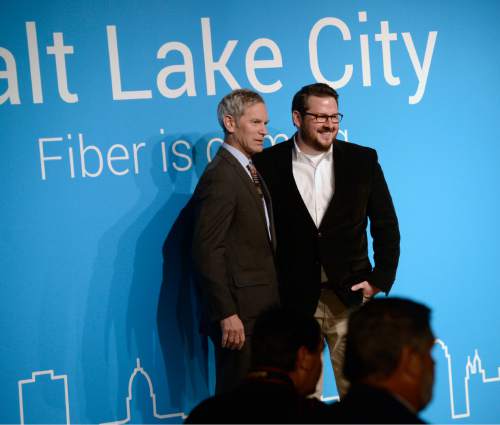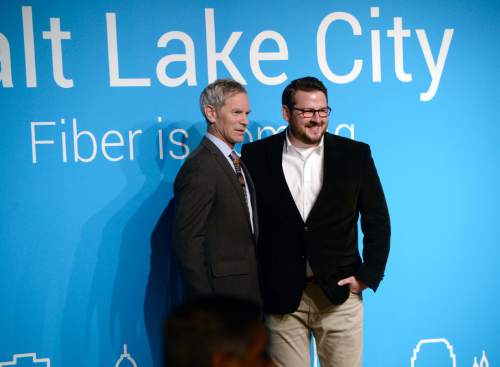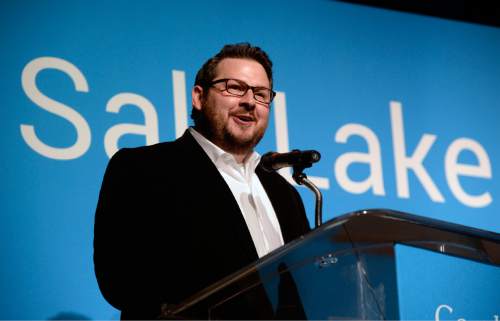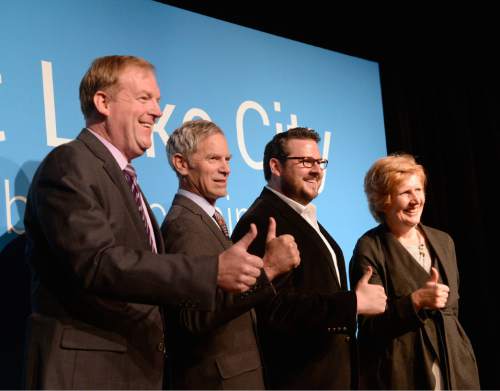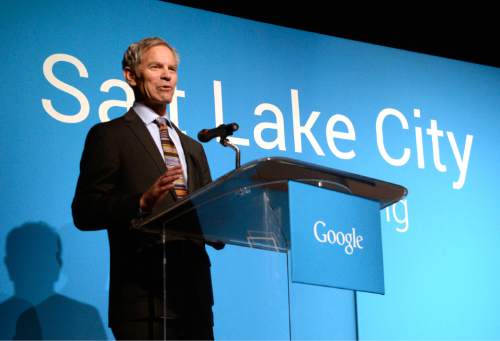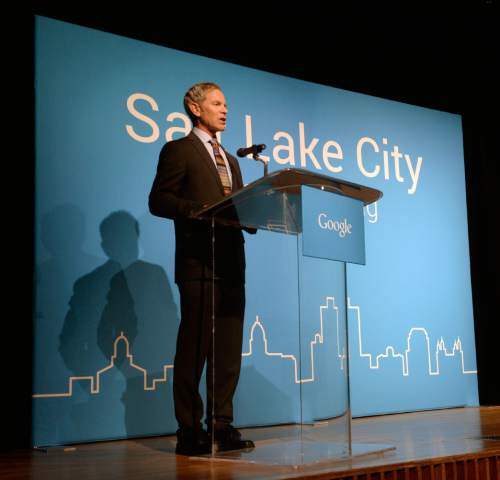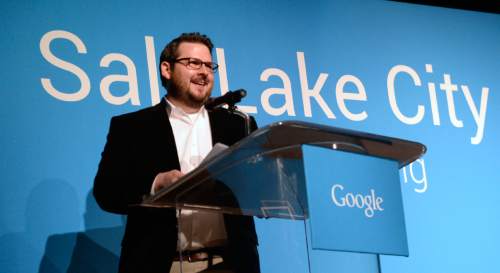This is an archived article that was published on sltrib.com in 2015, and information in the article may be outdated. It is provided only for personal research purposes and may not be reprinted.
Utah's capital is officially a Google Fiber city.
Google confirmed Tuesday it had picked Salt Lake City for its ultra-fast Internet and TV services, promising to make an advanced fiber-optic grid available to residential and business customers citywide within just a few years.
"We could not be more excited to have Google Fiber coming," Mayor Ralph Becker said. "This leap in speeds will open up an entirely new universe of exciting possibilities for Salt Lake City residents."
The Mountain View, Calif., company's announcement caps a yearlong market and technical study of the city as a potential locale for a Google-built network delivering gigabit-per-second access to users. Though customer hookups may be more than a year away, pending design and construction, the prospect already has city officials glowing about Google Fiber's broad potential.
At a jubilant midmorning news conference, city leaders joined company executives in saying Google's announcement signals a new future, with widely available, affordable and lightning-fast Web access spurring innovation, creativity, collaboration and prosperity.
"We've seen firsthand how speedy Internet can reshape communities, driving economic growth, emerging start-up scenes and new ways of using technology to improve lives," said Devin Baer, Google's associate city manager for Salt Lake City.
"Salt Lake City is the perfect place," Baer said, "to show us what's possible with gigabit speeds."
Begun as an experiment in 2010, Google Fiber today is well established in Kansas City; Austin, Texas; and Provo. After Google's January announcement that four Southeastern metro areas would get Google Fiber, Salt Lake City becomes the eighth U.S. locale in five years targeted for a fiber-optic network build-out by the $365 billion company.
A 2014 report by the cloud-service company Akamai Technologies pegged average peak speeds for Internet access in Utah at about 59.6 megabits per second, the seventh fastest statewide rate in the country. By comparison, Google Fiber's peak speeds reach 1,000 megabits per second, for gigabit upload and download rates on par with global technology centers such as Hong Kong, Tokyo and Seoul.
Becker said Google's high-capacity network promises to enrich student learning across the city and inspire developers of new tools exploiting faster Internet speeds. The grid also is likely to spawn more home-based businesses and encourage more office workers to telecommute, the mayor said, helping to reduce vehicle-miles driven and air pollution.
Baer shared the story of a Provo geneticist who is able to download information for an entire human genetic sequence in 30 minutes at gigabit speed, as opposed to 77 hours with his prior connection.
"What took days," Baer said, "now takes less than half an hour."
Google declined to say when construction of the network's thousands of miles of fiber-optic cable might be completed or how much the service would cost. One-gigabit Google Fiber service in other markets costs about $70 per month, or $130 monthly with a TV package.
But Becker and other leaders said Google Fiber will increase the availability of affordable Internet services for low-income Salt Lake City neighborhoods, helping to reduce worrisome disparities in technology access that officials call a "digital divide."
The head of a leading charitable group in Utah County said Google Fiber's presence in Provo, its community outreach and the company's partnerships with nonprofits have strengthened social services and brought more opportunity to disadvantaged residents.
Salt Lake City, the official said, can expect the same.
"If we work this together,'' said Bill Hulterstrom, president and CEO of United Way of Utah County, "this can help change the world and build bridges we've never had before."
In addition to hundreds of locally hired installers and technicians, Google's Salt Lake City-based team will include a community-impact manager focused on issues related to delivering Internet access to underserved residents, Baer said.
In late January, the company unveiled Google Fiber launches in Atlanta; Nashville, Tenn.; and the North Carolina cities of Charlotte and Raleigh-Durham. A company spokesman said Google continues to eye Phoenix, San Antonio and California's Bay Area as other possible Google Fiber venues.
Demographics clearly influenced Google's choice of Salt Lake City. Baer said analysts were swayed by the city's booming high-tech sector, diverse economy, top universities, growing job base and a computer-savvy population known for early adoption of technological change.
Becker said he and other city officials also heavily touted the inventive acumen of residents. The mayor said he assured Google they "will respond with a surge of innovation and ingenuity the likes of which you have rarely seen at your Silicon Valley headquarters."
Google now will finalize a detailed network map for the city and its utilities, while also encouraging future customers to register their interest in getting Google Fiber. That will let Google prioritize delivering service to geographic areas "where there is collected demand," Baer said.
According to city documents, Google will build a fiber-optic backbone encircling the city, then extend cables to neighborhoods via existing telephone poles and underground conduits.
Tuesday's announcement had been anticipated at least since late February, when the Salt Lake City Council voted on a customized franchise agreement and permitting process letting Google Fiber more efficiently locate its network facilities within city rights of way.
In 2013, Provo agreed to let Google take over its ailing iProvo city-run fiber network, upgrade network equipment and eventually offer gigabit service to residences and small businesses.
Provo Mayor John Curtis called the company "a tremendous partner in the community" and said Google Fiber is already having a substantial impact on the city's economy.
"For a city to be able to [offer] a gig speed for about $100 really is a game-changer," Curtis said, "especially for small businesses that were going without."
Google's competitive presence in Provo has led other Internet providers, including Comcast and CenturyLink, to lower prices and expand the availability of broadband services, he said.
The prestige of being picked for Google Fiber has also brought "tremendous value to Provo," the mayor said. "There's a coolness that you have as a Google city."
Twitter: @Tony_Semerad


